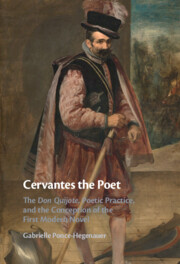 Cervantes the Poet
Cervantes the Poet Book contents
- Cervantes the Poet
- Cervantes the Poet
- Copyright page
- Dedication
- Contents
- Figures
- Acknowledgments
- Note on Abbreviations, Translations, and Terms
- Introduction The Unknown History of the Conception of the Don Quijote
- Chapter 1 Mimesis in the Court of Gentlewomen: The Pastoral Fabric of Everyday Life
- Chapter 2 Exalted Apostrophes: Cervantes in the Court of Isabel de Valois
- Chapter 3 Figura of the Poet: Pastoral Petrarchism as the Practice of Ingenious Gentlemen
- Chapter 4 The Form of Beauty: Lyric Lovers in the Mediterranean World
- Chapter 5 The Poet as Literary Character: Eclogues and Encomia in Madrid
- Chapter 6 The Literary Character as Poet: Lyric Subjectivity, Chronotopic Dynamism, and Plot in the Galatea
- Coda Alonso Quijano’s Lyric Subjectivity:
- Index
Chapter 2 - Exalted Apostrophes: Cervantes in the Court of Isabel de Valois
Published online by Cambridge University Press: 11 May 2023
- Cervantes the Poet
- Cervantes the Poet
- Copyright page
- Dedication
- Contents
- Figures
- Acknowledgments
- Note on Abbreviations, Translations, and Terms
- Introduction The Unknown History of the Conception of the Don Quijote
- Chapter 1 Mimesis in the Court of Gentlewomen: The Pastoral Fabric of Everyday Life
- Chapter 2 Exalted Apostrophes: Cervantes in the Court of Isabel de Valois
- Chapter 3 Figura of the Poet: Pastoral Petrarchism as the Practice of Ingenious Gentlemen
- Chapter 4 The Form of Beauty: Lyric Lovers in the Mediterranean World
- Chapter 5 The Poet as Literary Character: Eclogues and Encomia in Madrid
- Chapter 6 The Literary Character as Poet: Lyric Subjectivity, Chronotopic Dynamism, and Plot in the Galatea
- Coda Alonso Quijano’s Lyric Subjectivity:
- Index
Summary
Chapter 2 treats the early Italianate-poetry that Cervantes wrote for Isabel de Valois (1567, 1568) when he was around twenty years old as serious works composed within the particular cultural and poetic practices of the Habsburg court. In his first sonnet, Cervantes’ speaker develops a conceptual play between the speaking ingenio and the lofty lady through the use of an exalted apostrophe, a key feature of Pastoral Petrarchism that would inflect the subsequent decades of the author’s literary career. The only known copy of this sonnet was preserved in an early seventeenth-century manuscript collection of pastoral and erotic lyric and narrative poetry pertaining to the Habsburg court, now housed in the Bibliothèque Nationale de France, Richelieu. This chapter examines and draws upon the manuscript in order to reconstruct the literary environment in which Cervantes wrote, as it was understood by the early modern compiler (a primary source on readership, reception, and genre). Ms. Espagnole 373 also recontextualizes the poetry that Cervantes composed the following year for the untimely death of Isabel on October 3, 1568. This chapter considers Cervantes’ relationship to Giulio Acquaviva while the papal legate was present in the Habsburg court, his journey to Rome, and the Sigura affair.
Keywords
- Type
- Chapter
- Information
- Cervantes the PoetThe <i>Don Quijote</i>, Poetic Practice, and the Conception of the First Modern Novel, pp. 50 - 80Publisher: Cambridge University PressPrint publication year: 2023


